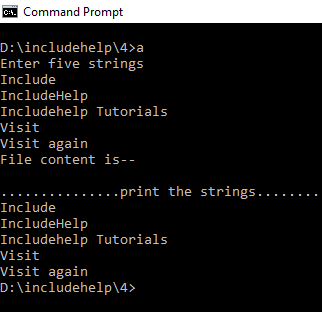C 中的 fgetpos() 函數
原型:
int fgetpos(FILE* filename, fpos_t *position);
參數:
FILE* filename, fpos_t *position,
返回類型:int(文件指示器指針的當前位置)
函數的使用:
在文件處理中,通過fgetpos()函數我們得到輸入文件流指示器的當前位置。每當我們需要文件中的文件指示器位置時,我們需要使用函數 fgetpos()。 fgetpos()函數的原型是:int fgetpos(FILE* filename, fpos_t *position);
這裏的數據類型position變量必須是fpos_t類型。
C 中的 fgetpos() 示例
#include <stdio.h>
#include <stdlib.h>
int main()
{
FILE* f;
char ch[100];
//Initialize the position variable
fpos_t pos;
//Create the file for write operation
f = fopen("includehelp.txt", "w+");
//Store the value of the function point indicator
fgetpos(f, &pos);
printf("Enter five strings\n");
for (int i = 0; i < 4; i++) {
//take the strings from the users
scanf("%[^\n]", &ch);
//write back to the file
fputs(ch, f);
//every time take a new line for the new entry string
//except for last entry.Otherwise print the last line twice
fputs("\n", f);
//clear the stdin stream buffer
//if we don't write this then after taking string
//%[^\n] is waiting for the '\n' or white space
fflush(stdin);
}
//take the strings from the users
scanf("%[^\n]", &ch);
fputs(ch, f);
//set the indicator position to the initial position of the file
fsetpos(f, &pos);
printf("File content is--\n");
printf("\n...............print the strings..............\n\n");
while (!feof(f)) {
//takes the first 100 character in the character array
fgets(ch, 100, f);
//and print the strings
printf("%s", ch);
}
//close the file
fclose(f);
return 0;
}輸出

相關用法
- C語言 fgets()用法及代碼示例
- C語言 fgetc()用法及代碼示例
- C語言 fgets() and gets()用法及代碼示例
- C語言 fgetc() and fputc()用法及代碼示例
- C語言 fread()用法及代碼示例
- C語言 feof()用法及代碼示例
- C語言 fillellipse()用法及代碼示例
- C語言 freopen()用法及代碼示例
- C語言 frexp()用法及代碼示例
- C語言 fclose()用法及代碼示例
- C語言 fseek() vs rewind()用法及代碼示例
- C語言 fflush()用法及代碼示例
- C語言 fputc()用法及代碼示例
- C語言 fputs()用法及代碼示例
- C語言 fillpoly()用法及代碼示例
- C語言 ftell()用法及代碼示例
- C語言 fseek()用法及代碼示例
- C語言 fscanf()用法及代碼示例
- C語言 ferror()用法及代碼示例
- C語言 fwrite()用法及代碼示例
注:本文由純淨天空篩選整理自Souvik Saha大神的英文原創作品 fgetpos() function in C language with Example。非經特殊聲明,原始代碼版權歸原作者所有,本譯文未經允許或授權,請勿轉載或複製。
